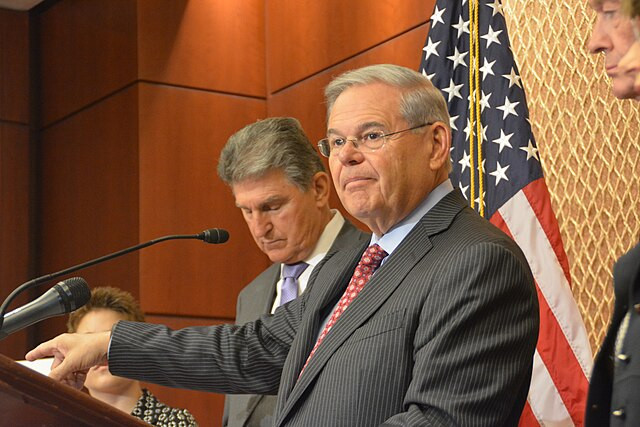After nine weeks of intensive testimony and legal arguments, the fate of Senator Bob Menendez now rests in the hands of a Manhattan jury. The jurors began their deliberations on Friday afternoon, tasked with deciding the outcome of a sprawling federal corruption case that has captivated national attention and could have significant political ramifications.
Senator Menendez, a prominent New Jersey Democrat, faces 18 separate charges, including bribery, extortion, wire fraud, obstruction of justice, and acting as a foreign agent. The charges stem from allegations that he participated in a yearslong bribery scheme involving his wife Nadine Menendez and two New Jersey businessmen, Wael Hana and Fred Daibes. Prosecutors allege that Menendez used his political influence to benefit Egyptian military interests and interfere in criminal prosecutions in exchange for gold bars, hundreds of thousands of dollars in cash, and other luxurious gifts.
If convicted, the 70-year-old senator could potentially spend the rest of his life in prison, marking a dramatic end to a 50-year political career that has seen him wield significant influence on the local, national, and global stages. Conversely, an acquittal or hung jury, similar to his 2017 trial, would represent a monumental legal victory and enable Menendez to continue his long-shot reelection bid as an independent.
The prosecution, led by the Southern District of New York, has sought to portray Menendez as an entitled elected official who sold his influence for personal gain. During the trial, jurors were shown visual evidence of the alleged bribes, including piles of cash and gold bars found during an FBI search of Menendez's home.
Prosecutors meticulously laid out their case, presenting testimony from 37 witnesses over seven weeks to illustrate the various corruption schemes they claim Menendez orchestrated with his co-defendants. One of the alleged co-conspirators, Jose Uribe, had already pleaded guilty and testified against Menendez. Nadine Menendez, charged alongside her husband, will be tried separately due to her breast cancer diagnosis.
Menendez's defense has consistently argued that the senator was unaware of any illicit dealings, suggesting that his wife acted independently. They also claimed that Menendez's habit of storing large amounts of cash was a result of familial trauma linked to the Cuban communist regime, despite Menendez being born in New York City before Fidel Castro came to power.
In his closing arguments, Menendez's defense attorney described the prosecution's case as "shaky and rotten to its core," insisting that the evidence presented was insufficient to prove the charges beyond a reasonable doubt. The defense also sought to undermine the credibility of the government's witnesses and evidence, casting the alleged bribes as gifts rather than criminal exchanges.
U.S. District Court Judge Sidney Stein, overseeing the trial, provided jurors with detailed instructions, including nuanced guidance on recent Supreme Court rulings that have made prosecuting political corruption more challenging. Judge Stein's instructions emphasized that not every gift to a public official constitutes a bribe, a point that Menendez's co-defendants have used to argue their innocence.
As deliberations begin, the jury's decision will hinge on whether they believe the prosecution's narrative of corruption or the defense's claims of innocuous gifts and misunderstood actions. The jury includes a diverse mix of professionals, including a doctor and a retired economist, who now face the complex task of navigating the legal and factual intricacies of the case.
The trial has had significant political implications, overshadowed by other high-profile events like former President Donald Trump's legal issues and the ongoing political drama surrounding President Joe Biden. A conviction could imperil the Democrats' narrow Senate majority and destabilize New Jersey's political landscape.
Menendez, who did not run in the Democratic primary, has floated the possibility of an independent bid for reelection if acquitted, potentially setting the stage for a contentious three-way race. Such a scenario could split the Democratic vote between Menendez and the Democratic nominee, Rep. Andy Kim, potentially paving the way for the Republican nominee, Curtis Bashaw, to win the seat.
Regardless of the jury's verdict, Menendez's political career and personal freedom hang in the balance. The deliberations mark the culmination of a high-stakes trial that could have lasting repercussions for one of New Jersey's most influential political figures. As the jury weighs the evidence, the nation watches, aware that their decision will resonate far beyond the courtroom.






